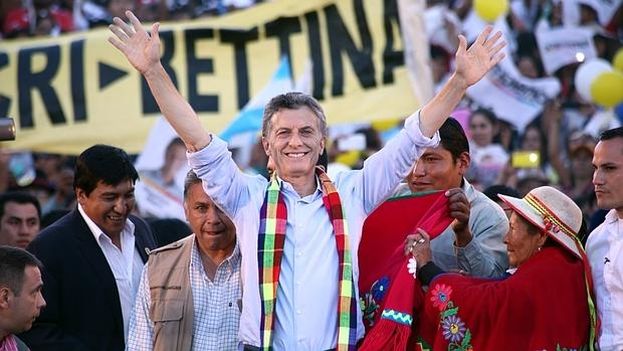
![]() 14ymedio, Mario Lleonart, 26 November 2015 — Mauricio Macri won. For those who hope for democracy in Cuba, the best option won. Although the recently-elected President hardly mentioned the island during his campaign, it is clear that the cause of liberty in Cuba will have a friend in him. His references to the situation in Venezuela have also been a wake-up call for the Plaza de la Revolución in Havana.
14ymedio, Mario Lleonart, 26 November 2015 — Mauricio Macri won. For those who hope for democracy in Cuba, the best option won. Although the recently-elected President hardly mentioned the island during his campaign, it is clear that the cause of liberty in Cuba will have a friend in him. His references to the situation in Venezuela have also been a wake-up call for the Plaza de la Revolución in Havana.
If he manages the transition well in his country, his will definitely be a major mandate. Nevertheless, Macri needs to get himself prepared for governing Argentina, starting off from the disaster left by Cristinismo [ed. note: Cristina Kirchner’s administration], which will signify quite an achievement in view of the obvious boycott by officialdom, which is showing a certain reluctance in handing over power. A gesture far-removed from what politicians who are really interested in the future of the country, and respectful of the popular will should do.
An indication of Macri’s intelligence and ability is his new cabinet. In the election of each post one can see a genuine intention to get Argentina to rise again like a phoenix from the ashes. The appointment of Susana Malcorra to the chancellorship was accompanied by the news of a top-class team to lead the country from December 10th.
The up-to-now Head of the Cabinet of the General Secretariat of the UN, a position in which he has performed exceptionally well since 2012, has earned public praise from Ban Ki-moon himself. “I have valued his advice, admired his dedication and benefitted from his leadership,” he once affirmed. Praise which is confirmed in Malcorra’s experience, in relation to international relations, an area in which Argentina has been very lacking.
Without doubt, the head of the cabinet could not be anyone else than Marcos Peña, one of the best thinkers in Macri’s electoral alliance, Propuesta Republicana (PRO). He was also one of the principle interlocutors at the time of laying out discussion points when he was head of the campaign. His youth — 38 years of age — is in keeping with the tone of this new party, which has been capable of destroying such a damaging Peronist tradition.
A demonstration that each Minister has been considered with the necessary care is the appointment of the social activist, ex-Buenos Aires legislator and present National Deputy, Sergio Bergman to the Environmental portfolio. This rabbi, chosen in 2011 as legislator for the City of Buenos Aires for the PRO, is an important and eloquent expert in relation to the present global context.
Bergman has been an unwavering opponent of the Argentina-Iran Memorandum of Understanding, signed by President Cristina Kirchner in relation to the matter of the attack perpetrated in 1994 on the headquarters of the Argentina Mutual Association of Israel (AMIA, its initials in Spanish), which resulted in the death of 85 people. His appointment is further evidence of the change of direction represented by Macri’s victory from the terrible course Argentina has been following.
The delay in naming the Minister of Employment also indicates the respect shown in this instance and says much for the care taken by Macri not to make a quick superficial decision on this position which is of such importance to the Argentinians, especially in times of change such as these.
Working with that team, Macri will be able to put behind them the dark times of scandals like the Chavista [ed. note: a reference to Venezuela’s late president Hugo Chavez and his and the current administration in that country] briefcase transported to Argentina by a businessman to finance Cristina’s campaign or the unpunished assassination of the Public Prosecutor Alberto Nisman, as well as the squandering of public money.
The new government will put an end to the period of justice denied, as in the case of the attack against the AMIA The renaming of the Centro Cultural Kirchner will symbolise the passing from one era to another.
The first target for Macri in the international field will be his participation in the next Mercosur summit, to take place in Asunción in December. He has already announced that he will insist then on the application of the democracy clause to Venezuela “for the perscution of the opposition.”
What has happened in Argentina will probably be reflected in the next few days in the Venezuela elections. The popularist policies urged by the Havana regime remain stuck in the past.
Translated by GH
